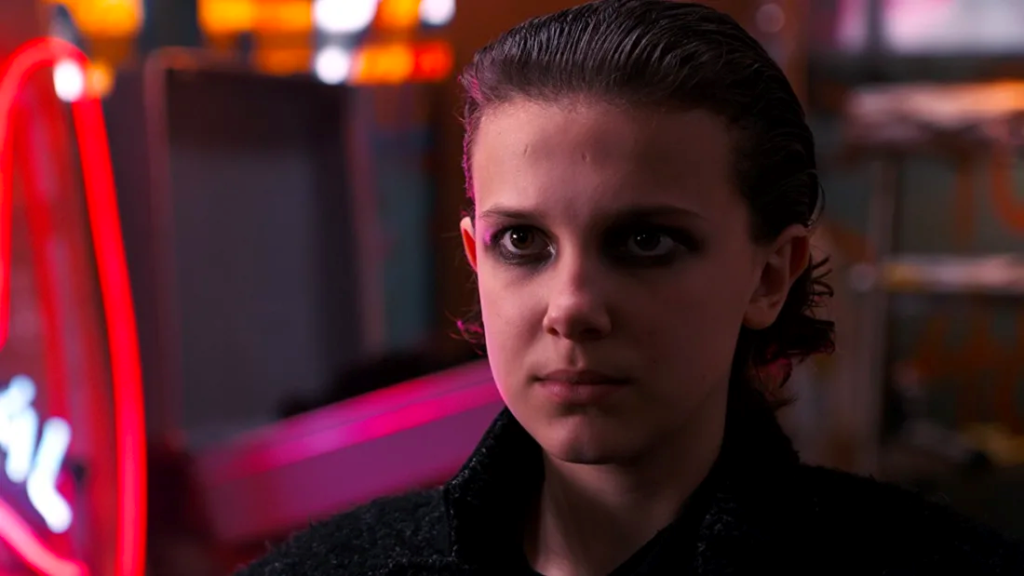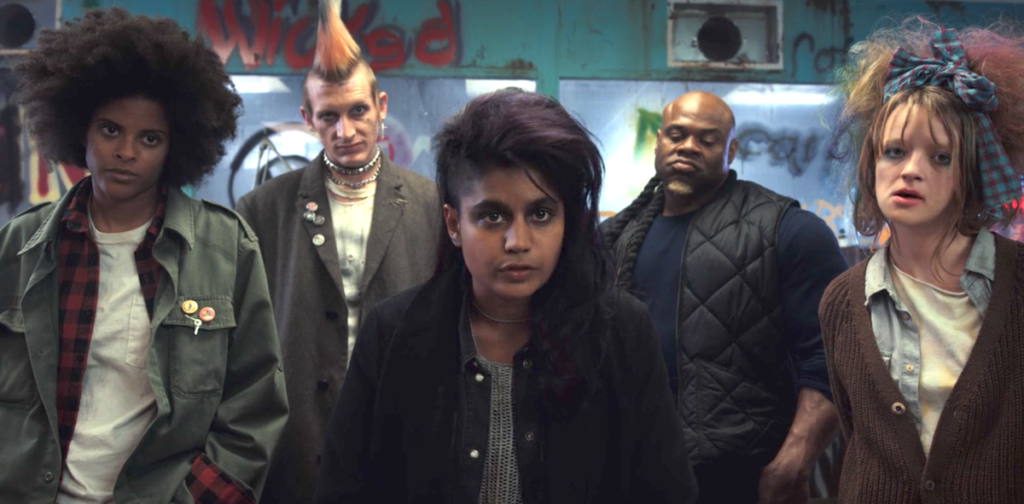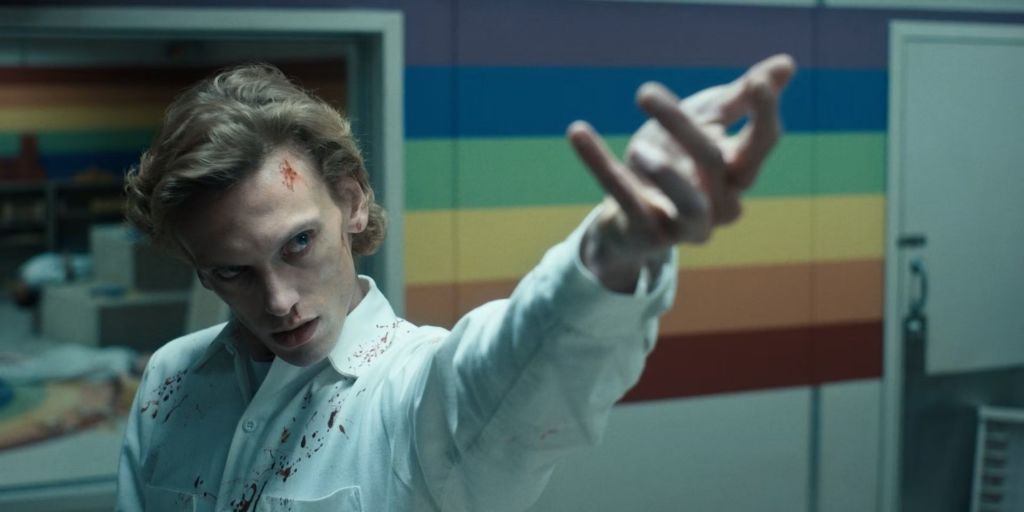Stranger Things and Surviving in the Modern World
Posted By Howe Abbott-Hiss On In North American New Right | Comments Disabled2,126 words
I recently finished watching the very popular Netflix series Stranger Things, and was impressed with the character of Eleven. She is a girl who comes from a difficult background and is gifted with exceptional abilities. I was particularly interested in the contrast between her mindset and that of others who have similar skills, as this is relevant to our situation today.
Eleven was kidnapped at birth by a scientist, Dr. Brenner, who runs a lab in which he studies children with strange powers. The fact that she was given a number rather than a name is a good indication of how he treated his test subjects. In one episode she locates another character called Kali, who was raised in the same environment and has the power to create illusions. While Eleven uses her powers to protect her friends and her home town, Kali is a criminal. She leads a gang of violent misfits remarkably similar to antifa.
Kali is the Hindu goddess of war and destruction, among other things, often depicted holding a severed head. Her Netflix namesake and her followers are no less violent or bizarre. When Eleven first encounters them and explains that she is looking for Kali, a mohawked thug is suspicious of her motives and threatens to torture her with a knife. All of the gang members have done something unusual with their appearances, including one black man who has dyed his beard blond. All cover their faces with masks when they are out committing crimes.
Kali tries to lead Eleven to follow her example in acting on her resentment towards her abusers and the rest of society. She has made a list of those who she says made the gang who they are. When Eleven asks if they murder these people, of them jokes, “No, we just give them a pat on the back.” The gang leader encourages Eleven to focus on how others have hurt her as a means of strengthening her powers. Society, as she puts it, “will never accept us,” and it is doubtful that she even wants it to.
Kali is supremely confident in the righteousness of her behavior. When she brings Eleven with her to rob a store, she explains that the store has insurance, so the only people they are really hurting are the “billionaire war criminals” who run everything. The store’s owner has a different view and aims a revolver at them, but with her mask off she insists with a straight face that “we are on your side.”
Kali has something to offer Eleven beyond vengeance: a new identity. She makes explicit that Eleven will belong in the gang; it will be her new home. Kali has also ostensibly rejected the identity given to her in the lab. Despite having a serial number tattooed on her arm, just as Eleven has, Kali is always known by her name, never as Eight. Eleven follows her example when introducing herself to the gang as Jane, her recently-discovered birth name.
Eleven is offered the opportunity for vengeance. The gang breaks into the apartment of an old man who had abused she and Kali in the lab where they were raised. Encouraged by Kali to be as cruel as possible, Eleven is at the point of killing him when she realizes that he has children, who are in the apartment with him. She spares his life and abandons the gang.
The show emphasizes the gang’s image to the point that I initially thought I was being treated to a message about how criminals are cool and glamorous. The gangsters give Eleven a makeover that makes her look less innocent, and she seems to approve. They even engage in a movie trope I will call “dramatic walking,” which emphasizes their confidence.
Eleven wants what Kali has to offer, but must reject it for something higher. As the police are pursuing them after the break-in, Kali tries to dissuade her from leaving. Eleven does not respond that she is good and that the gang is evil, but rather that she has an obligation to her friends back in her home town, who are still in danger from hostile forces.
Eleven’s experience is instructive for dissidents and for gifted young people alike. She often feels she does not belong, but still rejects identifying with a fringe group that permanently declares war on the world due to injustice. She acts out of a sense of duty to her friends, which is a noble instinct, rather than a desire to follow moral rules or fit in with others. She also seems much happier at times than would typically be expected for someone in her situation. Perhaps we can attribute this to the path she takes in life.
The first test subject in Eleven’s home lab was given the name One, and the name Vecna by Eleven’s friends — after a Dungeons & Dragons character — but his parents called him Henry. It is Henry who first tells Eleven that the lab’s main authority figure does not always tell the truth. He offers her the opportunity to escape, saying that he is impressed with her abilities and believes in her. But as he cannot come with her, she offers to help him first. Eleven uses her powers to remove a device that was implanted in Henry’s body in an attempt — at least according to him — to track and weaken him. Once this device is removed, Henry is capable of killing the guards who come to stop their escape attempt. He then proceeds to kill everyone else in the lab, including the children, with the exception of Eleven and Dr. Brenner.
Henry delivers a monologue to Eleven explaining his origins. He had similar abilities to hers even as a young child, including telekinesis and the ability to read minds. But when he used the latter power, he was revolted by what he found. People such as his parents, who presented themselves as moral and upstanding people, were quite different on the inside. With great knowledge came great hatred, and he attempted to murder his family after sending them to a parallel dimension. Only his father, Victor, survived, being brought back to the human world via familiar music. But Victor, unaware of his son’s abilities, blamed the attacks on a demon and was committed to a mental asylum.
Henry became the first test subject housed in the facility run by Brenner, who realized what his new ward had done and wanted to study his powers. As Henry puts it, the doctor was a mediocre man and thus sought greatness in others. But the boy was very unhappy in this environment, feeling that he had been imprisoned by his inferiors.
Finally, with Eleven’s help, he sees a chance to escape. Emphasizing that the two of them are superior to everyone else, he asks her to join him in conquering and remaking the world. But Eleven refuses, and uses her powers to banish him to another dimension known as the Upside Down. Here he finds monsters to whom he takes a liking, and through them he is the source of the attacks on the human world throughout the series. Eleven is thus responsible for the main threat to herself and her friends.
 [5]
[5]You can buy Trevor Lynch’s Classics of Right-Wing Cinema here [6].
In her confrontation with Henry at the end of Season Four, Eleven tries telling him that the real monster is not he, but Dr. Brenner, who drove him to his current state. But Henry explains that he chose his current path of his own free will. He had always admired predators such as those he found in the Upside Down, and was looking forward to replacing the ugliness of humanity with something better of his own creation. Unlike Kali, he does not see himself as a victim, but takes on a similar villainous role, feeling malice towards the whole world.
Several years ago I noticed a comment on a dissident website detailing the author’s frustrating experiences with ostensibly like-minded people. He noted that there were a great many who were happy to bemoan the state of the world in comments sections, but that whenever he approached them with ideas about taking action in the real world, they had no interest. “If we try anything like that, our enemies will just shut it down,” was their attitude. Instead, as he put it, they would rather fantasize along the lines of how they would change things “if I were emperor . . .”
This phrase stuck with me. People who cannot even imagine influencing a school board election will talk of how they would remake the world, “if only . . .” There is something sick about this. Such people would sympathize more with Henry, who imagines himself to be the destroyer of the world, or with Kali, who has appointed herself judge and executioner, than with Eleven. Perhaps they would be impressed with Henry for red-pilling Eleven on the nature of the lab and its leader, but while the other two are certainly revolting against the modern world, it is only Eleven who has done anything heroic.
It is easy to dismiss any superhero story as just another example of “if I were an emperor.” But I would interpret this story as an encouragement to heroic action. Eleven is never presented as godlike, or as someone who can effortlessly perform miracles. Instead it is always emphasized how difficult it is for her to use her powers, as it would be for the viewer to perform any great feat. Whenever she does so she gets a nosebleed, and as her friends put it, she gets drained like a battery and needs to recharge. At times she is visibly in great distress and collapses.
There was a territorial dispute in ancient Rome between the Romans and the neighboring Etruscans, and Gaius Mucius was assigned to resolve this by assassinating the Etruscan King. Before he could reach the King, howeve, he was captured by his guards. They brought him before the King and were about to execute him, but he managed to get to the nearby fireplace and put his right hand into the flames. “Look upon me and see what a petty thing the body is to those who seek great glory,” he said to the King. Gaius Mucius then threatened him, saying that if he was executed the Romans would simply send another man after him, and that they would continue to try until either the Etruscan King was dead or he agreed to negotiate.
The modern world would diagnose Gaius Mucius with some type of mental disorder. He permanently lost the use of his right hand, after all. Perhaps he was driven to do what he did as a result of bodily dysmorphia, or he had a burning fetish. Or, maybe he was narcissistic and attention-seeking. But the King did not see it this way. He was impressed by the man’s bravery, and immediately agreed to negotiate. The Romans in turn saw Gaius Mucius as a hero and gave him his own estate.
Eleven does something similar, although she does so in order to defend herself rather than impress any King. At one point she is attacked by a Lovecraftian monster and wounded in the leg. She realizes later that the creature had left a living piece of itself inside her, and uses her powers to essentially do surgery on herself without anesthetic. This is obviously very painful, and the strain is so great that she completely loses her powers for months afterwards.
Eleven’s great deeds include repeatedly saving the lives of her friends and her home town by defeating interdimensional predators, including one that invades its victims’ minds. This in itself is obviously not relevant to those of us in the real world, but there is no shortage of monstrous forces facing those of us in the modern world. Anyone exposed to mainstream society has had something alien invade his environment, his mind, and even his body. Fighting back may feel like doing surgery without training, let alone anesthesia — but that is no reason not to do it.
There is something higher in life. It is better than social acceptance, revenge on helpless enemies, or even shopping. This is the message that even the mainstream cannot help but deliver at times, because this is what many people instinctively know. It may be very difficult to attain, but it is not impossible.
Go out and do great deeds.
In memoriam Martin Christopher Rojas (1992-2022)
* * *
Counter-Currents has extended special privileges to those who donate $120 or more per year.
- First, donor comments will appear immediately instead of waiting in a moderation queue. (People who abuse this privilege will lose it.)
- Second, donors will have immediate access to all Counter-Currents posts. Non-donors will find that one post a day, five posts a week will be behind a “Paywall” and will be available to the general public after 30 days.
- Third, Paywall members have the ability to edit their comments.
- Fourth, Paywall members can “commission” a yearly article from Counter-Currents. Just send a question that you’d like to have discussed to [email protected] [7]. (Obviously, the topics must be suitable to Counter-Currents and its broader project, as well as the interests and expertise of our writers.)
To get full access to all content behind the paywall, sign up here:
Paywall Gift Subscriptions
 [8]If you are already behind the paywall and want to share the benefits, Counter-Currents also offers paywall gift subscriptions. We need just five things from you:
[8]If you are already behind the paywall and want to share the benefits, Counter-Currents also offers paywall gift subscriptions. We need just five things from you:
- your payment
- the recipient’s name
- the recipient’s email address
- your name
- your email address
To register, just fill out this form and we will walk you through the payment and registration process. There are a number of different payment options.



